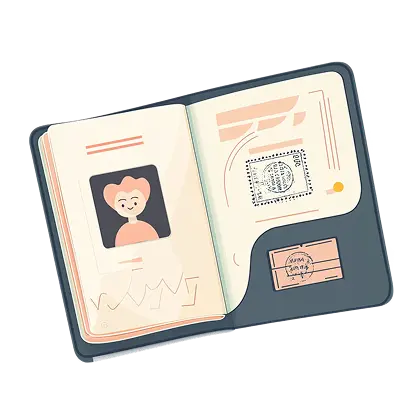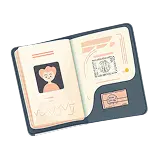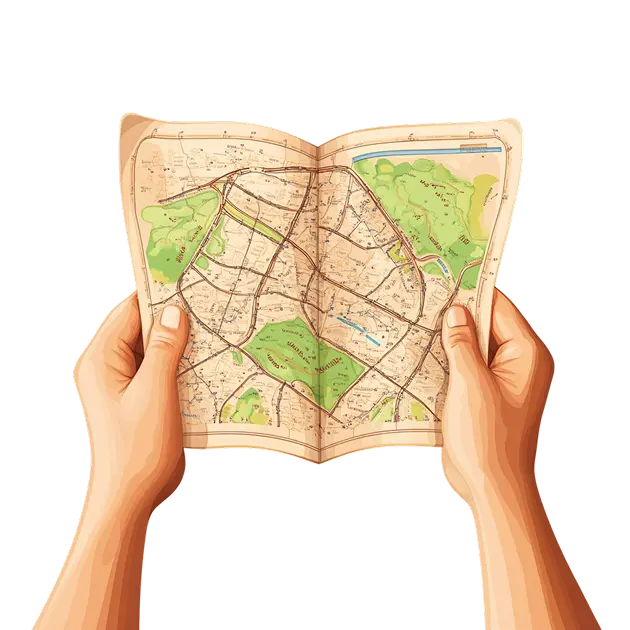

Passport (noun) — a document that is used for personal identification. It includes information about name, surname, date of birth, nationality, and a unique number. There are several types of passports: internal, international and diplomatic.
How to Pronounce “Passport”?
Stress the first part of the word by saying PASS-port. The letter a sounds similar to the one in father.
Level up your English with Koto!
Examples: How to Use “Passport” in a Sentence?
A passport is the key that opens this world to us, so in the instances below, you will see typical situations experienced by many people.
What Are Synonyms for the Word “Passport”?
There are some words that can be used instead of “passport” based on what you need it for. You will also meet a lot of connected terminology related to crossing borders.
Related nouns: pass biometric customs embassy
Synonyms (contextual): ID travel document
Common collocations: passport control hold a passport international passport
“Passport” Word Formation and Description in Context
The noun phrases with passport refer to its elements. Adjectives help define a passport’s status.
With adjectives: valid passport expired passport lost passport stolen passport
With verbs: renew a passport apply for a passport check a passport issue a passport
With nouns (noun + noun): passport number passport photo passport office passport stamp
Idioms and Phrases with “Passport”
What “passport” means in idioms in most cases serves as the key to something. The other phrases you will find below are very common when you travel.
-
A passport to something — a pass needed to pave the way for success, freedom, or anything else.
Learning a new language is apassport to new experiences. -
Show your passport — a phrase you can hear at airports, hotels, and train stations to verify your identity.
At the gate, I needed toshow my passport to board the plane. -
A visa in a passport — a sticker in your passport that you receive when you want to visit another country.
To visit the United States, I need to have avisa in my passport .
Test Your Knowledge of Passport Meaning – Quiz Time!
With so many cases of usage, let’s check your understanding of the meaning of “passport” with diverse exercises.
Enjoy personalized learning!
“Passport” Word in Other Languages
How do you spell “passport” in other popular European languages? Actually, the word sounds almost the same, so you won’t be at a loss if someone asks you to show your passport in Germany, Latin America, Canada, and many other corners of the world.
| Language | Word for “Passport” |
|---|---|
 Spanish
Spanish |
Pasaporte |
 French
French |
Passeport |
 German
German |
Reisepass |
Did You Know It? Fun Facts About “Passport”
Do you think passports existed in the ancient era? What does it mean for a passport to be strong? Why doesn’t the British monarch need to have a passport? Keep reading to know all the answers.
-
The first passports existed in Ancient China and India.
They weren’t in the form of books or ID cards we have now, but were necessary to enter cities or for bureaucracy. Chinese documents consisted of information about people’s appearances and ages. -
Singapore’s passport is the strongest in the world.
It means that the holders of these passports can travel without visas to many destinations. People from Singapore can visit 193 countries freely. For Japan and South Korea, the number is 190. -
King Charles III doesn’t have a passport.
In the United Kingdom, the reigning monarch doesn’t have to possess a passport, since the document is issued in their name. However, this rule isn’t applied to his family. -
Passport stamps can disappear soon.
According to the BBC, the European Union decided to refuse the settled tradition of stamping passports. Instead, to enter the EU, people will need to provide their biometric data.
Famous Quotes Featuring “Passport”
Unlocking success and opportunities, “passport” often appears in sayings of authors, business owners, and philosophers. Let’s take a look at some of them:
— Arthur Schopenhauer
Explanation: For the German philosopher, the true key to contentment is to having someone to talk to or ask for help, as it is difficult to move forward when no one is around.
— Bruce Chatwin, “The Songlines”
Explanation: As a writer, Bruce Chatwin valued his notebook, with the thoughts and ideas, far more than his documents, since it would mean losing a crucial part of his work.
Explanation: Possessing strong skills, a person is capable of getting the opportunity to understand people better, achieve fascinating results in a career, and break the chains of ignorance.




